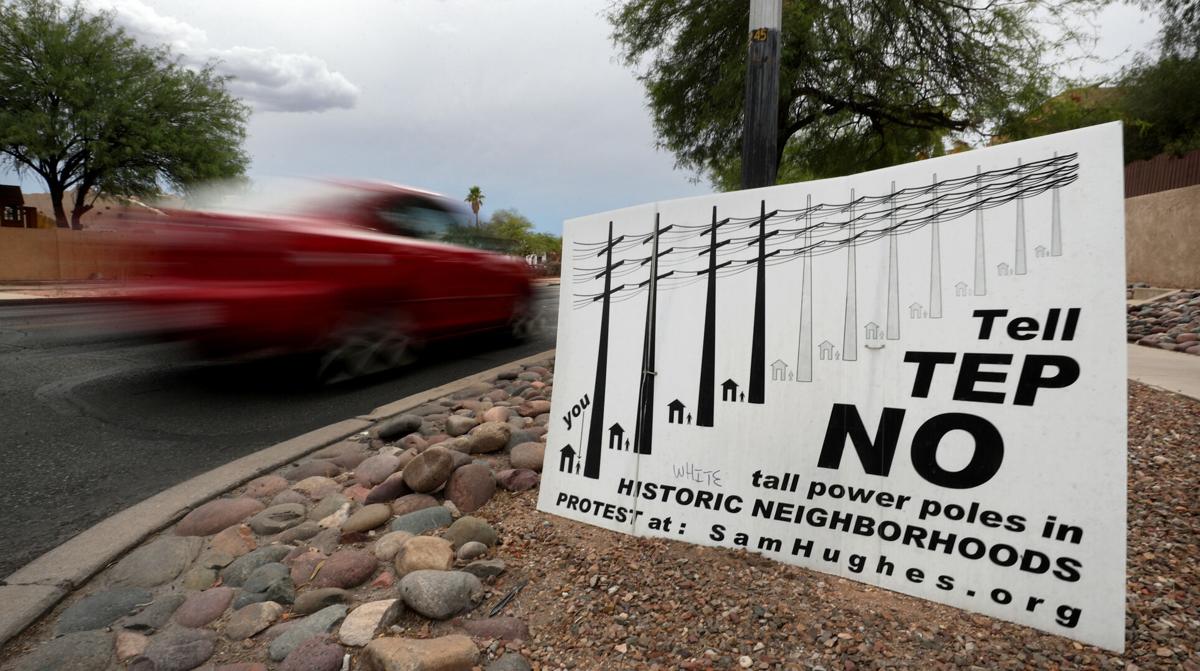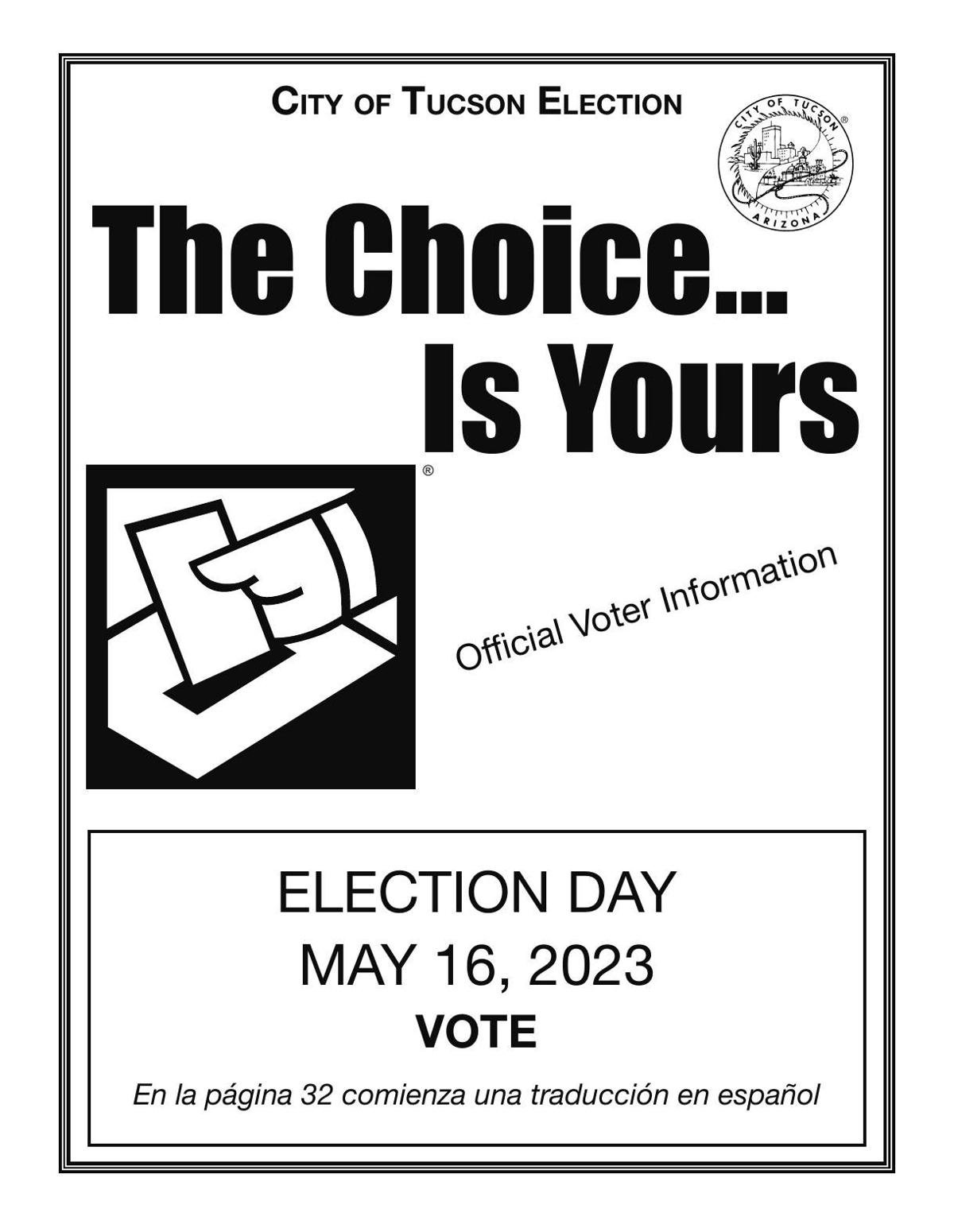Would you be willing to pay another a buck or two on your monthly power bill to bury new transmission lines through Tucson and support future city efforts to combat climate change?
That’s the question before Tucson voters in a May 16 special city election to approve a new franchise agreement for Tucson Electric Power Co.
The new agreement will be up for a vote as Proposition 412.
The city has mailed out information pamphlets to registered voters and plans to mail out ballots on Wednesday, April 19.
The proposed franchise agreement, referred to the ballot by the city council in late January, would replace a current agreement that expires in 2026.
The new pact includes the current 2.25% franchise fee paid on revenues from TEP customers within the city limits, along with a new, 0.75% “community resilience fee” to fund underground installation of transmission lines as well as the city’s climate-related initiatives.
The changes would raise the average residential TEP customer’s bill by an estimated 93 cents a month and raise small business customers’ bills by $2.65 a month, the utility says. Larger power users would pay more.
The current franchise agreement generates about $14 million a year, and the 0.75% increase would generate about $5 million extra annually, according to the city.
‘Undergrounding’ power lines
The new agreement was negotiated mainly to raise additional revenue to cover the costs of underground installation of TEP’s proposed Kino to DeMoss-Petrie 138-kilovolt transmission line.
The new line would run roughly seven miles from South Kino Parkway and East 36th Street, north through the University of Arizona campus and the city to a substation, featuring power poles ranging from 75 feet to 110 feet tall.
But the project has faced vehement pushback from the city and residents of historic neighborhoods over ordinances that ban overhead power lines in the city’s designated scenic and gateway corridors.
TEP says undergrounding the project would be too expensive — costing more than 13 times the cost of overhead lines or about $60 million to bury six miles of the line — and that it would be unfair to tack the added cost onto the bills of customers outside of Tucson’s city limits.
Opponents say the transmission lines and tall poles would create a visual blight on historic neighborhoods including Jefferson Park and Sam Hughes, cutting property values.
Advancing climate action in Tucson
Under the proposed franchise agreement, part of the money raised through the franchise-fee increase could be used for projects that advance the city’s recently approved Climate Action and Adaptation Plan, which aims to make the entire city “carbon neutral” by 2045 and all city facilities achieving the same status by 2030.
Specific efforts under the plan include decarbonizing city-owned and operated buildings and facilities, promoting distributed energy resources such as rooftop solar, expanding electric vehicle charging infrastructure and shifting public agency fleets to zero-emission and net-zero-emission vehicles.
Paying to underground the TEP power lines will be the top priority for funds generated by the 0.75% fee for the first 10 years of the agreement, though 10% of the fee revenues would be allocated annually to climate projects.
Use of the climate-action funding would be overseen by a five-member committee made up of two city representatives, two TEP representatives and one member from either the city or TEP, or a third party approved by both.
Aside from the new fee, up to one-ninth of the 2.25% franchise fee is earmarked to be used for low-income resident assistance, undergrounding power lines or to further the city’s climate goals, under the new franchise agreement.
Going further
The new franchise agreement is supported by TEP, the mayor and most of the city council.
“Approval of the measure would support service reliability, energy resilience and sustainability for our entire community,” TEP spokesman Joe Barrios said.
“In particular, there’s a critical need to make improvements in the portion of our energy grid that serves customers throughout the midtown area,” he said, citing the poor conditions of some transformers in the area.
Barrios said if Prop 412 fails, TEP will need to spend more than $12 million to reinforce an older, lower-voltage system to help maintain service.
“We’ll need to continue working toward longer-term improvements with greater capacity to meet customer’s growing energy needs,” he said.
While the funding directive for the city’s future climate action plans was added late in the process of negotiating the new franchise agreement, Ward 3 Council Member Kevin Dahl said it was an important addition.
“I’m so very proud that mayor and council were able to work that in,” Dahl said, noting that this is the city’s first franchise agreement to address climate change. “Some people may argue that it’s not enough, but I’m proud that we were able to negotiate that, and I think it’s going to have a positive impact.”
One who feels like the agreement doesn’t go far enough is Council Member Steve Kozachik, who had initially voice neighborhood concerns over TEP’s proposal for overhead transmission lines.
Kozachik said TEP should commit some of its own money to help Tucson further its climate goals, instead of simply collecting fees from ratepayers.
“TEP should have more financial skin in the climate/renewable game than what’s on the ballot,” Kozachik said in an email.
Pros and cons
Public comments on the project submitted to TEP were overwhelmingly opposed to the construction of overhead high-voltage lines, and some said more neighborhood-level solar energy installations would reduce the need for transmission lines running through the city.
Besides Dahl, other supporters of the new agreement include Tucson Mayor Regina Romero, council members Lane Santa Cruz, Paul Cunningham and Nikki Lee; the Sam Hughes Neighborhood Association; and the steering committee of the Underground Coalition, which includes about a dozen neighborhood associations, according to Yes on 412, a city-registered political action committee backed by TEP shareholder funding.
Other supporters include the Tucson Metro Chamber of Commerce, the Southern Arizona Leadership Council, Sun Corridor Inc., the Tucson Police Officers Association, the Tucson Fire Fighters Association IAFF Local 479 and several current and former legislators.
Among organized opposition to the new TEP franchise agreement is a group called Prop 412 facts, created by the Phoenix-based Strong Communities Foundation of Arizona, a nonprofit voter education organization espousing conservative, free-market values.
A website set up by the group opposes the community resilience fee imposed by Prop. 412 and the use of the money to fund Tucson’s Climate Action Plan, citing proposals to narrow some roads to accommodate bicycles and pedestrians, “permanently inhibiting access to small businesses,” reducing personal vehicles by 40% by 2050, and establishing Tucson as a “15-minute city” — where people can walk or bike 15 minutes to school, work and shops — as an infringement on personal choice.
But the Prop 412 Facts website doesn’t mention anywhere that 90% of the money from the new fee will go to pay to underground TEP’s proposed transmission line, at least for the first 10 years.
The Pima County Republican Party also voiced opposition to the new TEP franchise agreement, citing arguments made by Prop 412 Facts.
How to vote
To vote in the special election, you must have resided in the city of Tucson before or starting April 16, be registered to vote on or before April 17 and be at least 18 years old on election day, May 16.
Mail-in ballots should be sent by May 10 to ensure they arrive at the City Clerk’s office by election day.
Voters may drop off their voted and sealed ballots starting Wednesday, April 19, through election day at several drop-off centers, or from 6 a.m. to 7 p.m. on election day at six voting locations.
The drop-off locations include the Tucson City Clerk Elections Center, 800 E. 12th Street, where ballots may be dropped off from 8 a.m. to 5 p.m. weekdays from April 19 through May 15 and from 6 a.m. to 7 p.m. on election day, when it will also function as a location for in-person voting.
The other drop-off sites are the Pima County Recorder’s downtown office, 240 N. Stone Ave., and the County Recorder’s Elections Department, 6550 S. Country Club Road, during the same days and hours as the city Elections Center.
Voted ballots also can be dropped off on election day at the voting locations: Department of Housing and Community Development, 310 N. Commerce Park Loop; Morris K. Udall Regional Center, 7200 E. Tanque Verde Road; Donna R. Liggins Recreation Center, 2160 N. Sixth Ave.; William Clements Recreation Center, 8155 E. Poinciana Drive; El Pueblo Senior Center, 101 W. Irvington Road; and Parks and Recreation Administration at Randolph Park, 900 S. Randolph Way.
At the election-day voting locations, voters may bring their vote-by-mail ballot, cast the ballot in person and drop it in the ballot box; or receive and vote a vote-by-mail replacement ballot.
Check out some innovative and sometimes overlooked energy-saving strategies that can help you and your wallet survive Tucson's summer swelter.






